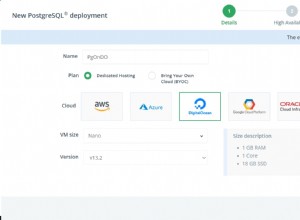La respuesta clásica a este problema es usar 127.0.0.1 o la IP del host o el nombre de host en lugar del "nombre especial" localhost . De la documentación
:
Y luego:
Sin embargo, este simple truco no parece funcionar en tu caso, así que tienes que forzar de alguna manera el uso de un socket TCP. Como lo explicaste tú mismo, al invocar mysql en la línea de comando, usa el --protocol tcp opción.
Como se explica aquí
, desde SQLAlchemy, puede pasar las opciones relevantes (si las hay) a su controlador como opciones de URL o utilizando connect_args argumento de palabra clave.
Por ejemplo, usando PyMySQL , en un sistema de prueba que configuré para ese propósito (MariaDB 10.0.12, SQLAlchemy 0.9.8 y PyMySQL 0.6.2) obtuve los siguientes resultados:
>>> engine = create_engine(
"mysql+pymysql://sylvain:[email protected]/db?host=localhost?port=3306")
# ^^^^^^^^^^^^^^^^^^^^^^^^^^
# Force TCP socket. Notice the two uses of `?`
# Normally URL options should use `?` and `&`
# after that. But that doesn't work here (bug?)
>>> conn = engine.connect()
>>> conn.execute("SELECT host FROM INFORMATION_SCHEMA.PROCESSLIST WHERE ID = CONNECTION_ID()").fetchall()
[('localhost:54164',)]
# Same result by using 127.0.0.1 instead of localhost:
>>> engine = create_engine(
"mysql+pymysql://sylvain:[email protected]/db?host=localhost?port=3306")
>>> conn = engine.connect()
>>> conn.execute("SELECT host FROM INFORMATION_SCHEMA.PROCESSLIST WHERE ID = CONNECTION_ID()").fetchall()
[('localhost:54164',)]
# Alternatively, using connect_args:
>>> engine = create_engine("mysql+pymysql://sylvain:[email protected]/db",
connect_args= dict(host='localhost', port=3306))
>>> conn = engine.connect()
>>> conn.execute("SELECT host FROM INFORMATION_SCHEMA.PROCESSLIST WHERE ID = CONNECTION_ID()").fetchall()
[('localhost:54353',)]
Como notó, ambos usarán una conexión TCP (lo sé por el número de puerto después del nombre de host). Por otro lado:
>>> engine = create_engine(
"mysql+pymysql://sylvain:[email protected]/db?unix_socket=/path/to/mysql.sock")
# ^^^^^^^^^^^^^^^^^^^^^^^^^^^^^^^^^
# Specify the path to mysql.sock in
# the `unix_socket` option will force
# usage of a UNIX socket
>>> conn = engine.connect()
>>> conn.execute("SELECT host FROM INFORMATION_SCHEMA.PROCESSLIST WHERE ID = CONNECTION_ID()").fetchall()
[('localhost',)]
# Same result by using 127.0.0.1 instead of localhost:
>>> engine = create_engine(
"mysql+pymysql://sylvain:[email protected]/db?unix_socket=/path/to/mysql.sock")
>>> conn = engine.connect()
>>> conn.execute("SELECT host FROM INFORMATION_SCHEMA.PROCESSLIST WHERE ID = CONNECTION_ID()").fetchall()
[('localhost',)]
# Alternatively, using connect_args:
>>> engine = create_engine("mysql+pymysql://sylvain:[email protected]/db",
connect_args= dict(unix_socket="/path/to/mysql.sock"))
>>> conn = engine.connect()
>>> conn.execute("SELECT host FROM INFORMATION_SCHEMA.PROCESSLIST WHERE ID = CONNECTION_ID()").fetchall()
[('localhost',)]
Sin puerto después del nombre de host :este es un zócalo UNIX.




